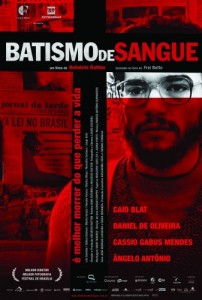
 Director: Helvécio Ratton
Director: Helvécio Ratton
Writer(s): Dani Patarra, Helvécio Ratton
Actor(s): Caio Blat, Daniel de Oliveira, Léo Quinta̋o, Odilon Esteves, Ângelo Antônio, Cássio Gabus Mendes, Murilo Grossi, Renato Parara, Marku Ribas, Marcélia Cartaxo, Jorge Emil
Production Co.: VideoFilmes
Country: Brazil
Year: 2006
Language and subtitle information: In Portuguese; optional English, Spanish and French subtitles
Format: DVD
[ratings]
Summary: Brazil was ruled by military dictatorship from mid 60’s to mid 80’s. In the 60’s, the Dominican friars Tito, Betto, Fernando and Ivo help leftist organizations, but they are arrested and tortured by the chief of political and security police Fleury, who is trying to arrest the leader Carlos Marighella. Tito and Fernando are submitted to the torture and betray Marighella, who is ambushed and executed by Fleury. In 1973, the exiled friar Tito commits suicide in France.
Supplemental Materials:
This film, based on a book, recounts the real story of three young Dominican friars who aid the anti-military revolutions. This film is particularly interesting not because it shows scenes of torture or speaks about the horrors of the military dictatorship, but because it shows the connection that some parts of the Church had to the political and social climate at the time.
Batismo de Sangue was not an easy film to watch. The raw reality and horror of the torture that went on during the Brazilian Military Dictatorship in the 60s, 70s and early 80s of the twentieth century was portrayed in full, and its effects on the so-called subversives of the nation during that period was evidently extremely traumatic. The film follows the experiences of 4 very religious aspiring priests in Brazil during that time period. They are each tortured along with countless others for having supposedly communist and subversive views. I found it interesting that the one who was freed as part of the exchange for the release of the Swiss ambassador was the one who committed suicide in the end, while the other three seemed to move past it. This concept that the experiences he went through, an extra round of torture and confinement that the others did not have and being told repeatedly that he was a traitor, were so scarring that suicide in the end was his only answer. On the whole, I thought this was a very well-done and intriguing film that I’m glad I watched because it greatly enhanced my knowledge of the torture that went on during this horrifying time in Brazil, but it is graphic and not for the weary.
The film was difficult to watch, but drew me in and maintained my attention/interest throughout. It follows a group of young Dominican friars who were aiding the leftist campaign for social revolution through their connections within the Church. The film explored the relationship between the state and the Church. It was interesting to see the strength that their faith provided the young revolutionaries and served to further their commitment to the cause. While the Church is named as the one institution out of military control. the film demonstrates the complex relationship between prominent figures because due to their political affiliations, moral values, and the divided views of what constitutes national security. The film provides a different lens from which to analysis Church-affiliated involvement in revolutionary efforts.
“Batismo de Sangue” is a film that follows two Dominican friars’ resistance to the Brazilian military dictatorship. Their opposition leads them to join the communist guerrilla movement. Such an alliance results in their capture and torture, which is portrayed in all its gory detail. The film touches upon many important factors of the time like the involvement of religious figures in anti-war movements and the excess use of extreme torture. In addition, the psychological effects of torture, like one of the friars’ suicide, are vividly portrayed.